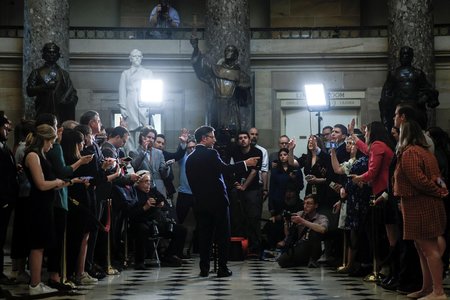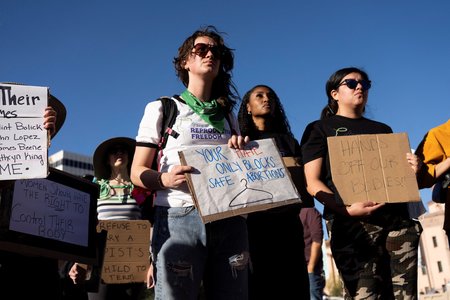Attention shifts from the Republican National Convention in Cleveland to Philadelphia, where Democrats will meet to officially nominate Hillary Clinton as their presidential candidate next week. Washington Week is on the ground in the city of brotherly love to hear what voters in the battleground state of Pennsylvania care about in the 2016 election. From race relations and policing to the impact of the Republican convention, voters in Philadelphia turn the table on our Washington Week regulars.
Special: Washington Week Extra: Philadelphia Edition - What voters care about in battleground state Pennsylvania
Jul. 22, 2016 AT 6:51 p.m. EDT
TRANSCRIPT
Notice: Transcripts are machine and human generated and lightly edited for accuracy. They may contain errors.
MS. IFILL: Hello, and welcome to Philadelphia, home of the Liberty Bell and of next week’s Democratic National Convention. Tonight: your questions, our answers on a special edition of Washington Week .
ANNOUNCER: This is the Washington Week Extra: Philadelphia Edition . Once again, from the Philadelphia Theatre Company at the Suzanne Roberts Theatre, moderator Gwen Ifill. (Applause, cheers.)
MS. IFILL: Hello. Hello, everyone. For those of us who spent the week in the political bubble of the Quicken Loans Arena in Cleveland, we have about a day and a half before we dive right back into the political bubble here in Philadelphia with the Democrats at Wells Fargo Arena. So we’re taking the opportunity to ask our questions – to ask our audience, that is, for their questions, and to get the best answers we can manage from Alexis Simendinger of RealClearPolitics, Michael Duffy of TIME Magazine, Jeanne Cummings of The Wall Street Journal , and John Harwood of CNBC and The New York Times .
I’m going to start by – with this gentleman here. Yeah, exactly. You knew if I was standing here there was a problem. (Laughter.) Do you have a question for our panel?
Q: Yes. I’m just – in light of the way this whole campaign has unfolded, I’m just curious whether the red-state/blue-state trope that has been – characterized the last few elections is still a valid frame for this one.
MS. IFILL: That’s a good question. Alexis, why don’t you take it?
MS. SIMENDINGER: Well, I would answer decisively yes in the sense that we still have – at the very beginning, where we are now, we are looking at an Electoral College map that tells us some early things about who has the advantage. And that would still be Secretary Clinton, looking at the blue states where she is going to draw some reliable numbers for the Electoral College. So we know that she’s ahead, 209 to 164 I think the last time I looked on the RealClearPolitics map.
So then you’re looking at a dozen states in the middle, and those states can go either way, right? Those are the swing states. So we tend to think of this election as a very polarized electorate, and we know something about the blue states and the red states, how they reliably are voting or leaning. And we know where the election will be won or lost, more or less, by looking at those toss-up states in the middle.
MS. IFILL: Let me ask Jeanne something, because you and I were both at a(n) event, a breakfast meeting with Donald Trump Jr. this week in Cleveland. And he was asked about the map, and he said, you know, we’re serious as a heart attack when we say we’re going to go after Connecticut and California, which seemed like Democrats are hooting about this idea because it seems like a waste of resources. But their theory seems to be that they can force Hillary Clinton to spend the money. What did you think of that, or is this real?
MS. CUMMINGS: I think – I didn’t think much of it. (Laughter.) Connecticut I think the – President Obama won by around 20 points. California is – there are no indications that they have the resources to try to put it in play. Sometimes I wonder if they aren’t saying that because he’s going to be in California fairly often to raise money, so you know, he could say he’ll probably have rallies to –
MS. IFILL: Has a home there.
MS. CUMMINGS: He has a home there. And he seems oddly – well, not oddly, but I think he really doesn’t like fundraising and he doesn’t like the fundraising events to be associated with him, given all of his rhetoric in the campaign about how he’s – Hillary Clinton will be a puppet of her donors. He wants to blur the lines between his donors and himself.
Now, they also do mention New York, and I’m kind of curious. I mean, I don’t think New York is within his grasp, but Upstate New York is filled with many of the sort of voter that is most drawn to him. Those are white working-class men without college educations, and there are large pockets in Upstate New York. And then, you know, you look in the City, he’s got connections there too. So New York might be more interesting, although I think that ultimately it stays blue.
MS. IFILL: He did two interesting things this week in that he – one involved North Carolina and his comments about LGBT – transgender bathroom laws, which didn’t make the North Carolina delegation – a state that everyone tries to compete for – work very well. He also was not happy that the governor of Ohio, John Kasich, kind of specifically, overwhelmingly spurned him by not coming to the actual convention. But Ohio is also important. So, John Harwood, as you look at those kinds of decisions, is he taking a risk that’s worth taking?
MR. HARWOOD: Well, yes, given his options. I think what we’re looking at in a map is one that isn’t transformed, but might be tweaked a little bit. That’s the hope for Donald Trump. If he can get his vote up substantially among those white working-class voters in states like Pennsylvania, Ohio, Michigan, he might be able to put them in play. The problem is that the more you lean toward going after those voters, as he did very aggressively in his convention speech last night, you risk losing people on the other end. He is hemorrhaging votes right now among white college-educated women. And so sometimes you have to shake up the balance to try to get a different outcome, but it’s a real question as to whether he can succeed, especially not only losing votes among those better-educated whites and especially women, but also the effect of his appeal last night on Latinos. His numbers are below 20 percent in our NBC/ Wall Street Journal poll. It’s a tough equation for him right now.
MS. IFILL: And before we go to our next question, Michael, would you like to weigh in on that?
MR. DUFFY: I don’t have much to add, other than the fact that what’s interesting about everything that’s been said is that there are – to somewhat I think all of our surprise, there are more states in that middle group of swing states than we have seen in the last four or five elections because both candidates put states that typically are not in play into play. So, as John said, you have maybe Pennsylvania, maybe Michigan, which have been reliably blue lately, suddenly up for grabs, although the trends are tricky; and the same thing on the other side, there may be a chance for the Democrats to go into a place like Georgia or Arizona and pick off a state, depending on how that Latino thing goes. So there’s movement on both ends, and that makes a larger number of up-for-grabs states.
MS. IFILL: Fascinating.
Hi.
Q: Hi. I was wondering if you thought Ted Cruz was set up by Trump to speak at the election (sic) this past week?
MR. DUFFY: Well, could I just – could I just –
MS. IFILL: Please.
MR. DUFFY: I think it was like they both tried to double-cross each other. (Laughter.) Because clearly what Cruz did is he went in and said I want a prime-time speech, I want a demonstration, and I don’t want to have to endorse you. And Trump said, well, you can have that, but you have to endorse. And Cruz’s people said, yeah, you and what army are going to make us endorse? And the Trump people said, we don’t really know. So Cruz gave his speech, got the demonstration, didn’t do the endorsement. But meanwhile, the Trump people came up with their double-cross, which was to stage the rather dramatic both spontaneous and organized shouting down of him during that amazing evening. And then the – I don’t know what to call it – stomping that Trump did in real time by going into the booth – was it CNN?
MS. IFILL: No, he walked right into the hall.
MR. DUFFY: Right into the hall.
MS. IFILL: Into the family box at the very moment that Cruz was being booed.
MR. DUFFY: In the family box, right.
MS. IFILL: Coincidental. (Laughter.) He had to get there anyway. He had to hear his son speak. I’m doing my Donald Trump, I’m sorry.
MR. DUFFY: My feeling is they had a deal and they both double-crossed each other.
MS. IFILL: Yeah, I –
MS. SIMENDINGER: And then he got a chance to argue how big and magnanimous he was.
MR. HARWOOD: But I would say, if it was a setup – which I agree with Michael’s analysis – I don’t think it benefited Donald Trump because Donald Trump, to have a chance to win the election, has got to get 90 percent of Republican voters on his side. And if you advertise through a booing process – they may be booing Ted Cruz, and that may be embarrassing for Ted Cruz, but you’re advertising to the country that there is deep discord within the party, and I don’t think that helps Donald Trump get to that 90 percent level he needs.
MS. CUMMINGS: Can I just differ a little bit?
MS. IFILL: Sure, please. I love it when you fight among yourselves. (Laughter.)
MS. CUMMINGS: I mean, I just felt like, with Cruz doing what he was going to do and Trump giving him the stage, the division was going to be apparent. So what he got were – he only had two – Trump set it up so there were only two outcomes: Ted Cruz and the image of him being booed off the RNC stage –
MS. IFILL: Which is exactly the phraseology, by the way, that he used today, Donald Trump did.
MS. CUMMINGS: Exactly, right, which is a way of discrediting Cruz within the party. Or a spontaneous forced endorsement. That’s the only two places Ted Cruz could go, and I thought that was kind of a checkmate for Trump.
MS. IFILL: OK. Well, I’m not –
MS. CUMMINGS: We’ll see.
MS. IFILL: Yeah, we’ll see.
Hi.
Q: Hi. Why do you think there’s so much animosity toward Hillary Clinton when she’s given her life to public service?
MS. SIMENDINGER: Oh gosh, do we have another show? (Laughter.)
MS. IFILL: Go for it, Alexis. Let us know.
MS. SIMENDINGER: Well, one of the – just the shorter answer is that because she has spent a long time in the public eye, because she was the wife of a politician who himself had a colorful tenure in – (laughter) – as president, and of course before that as governor of Arkansas, she is, you know, the best-known female politician out there. And very few people have been undecided about her based on our experience with her over time, all of us as Americans. So one of the challenges she’s had is, whether she’s liked it or not, elements of the world in which she was presiding or being involved in have stuck to her over all that period of time. There’s also an element of gender bias involved, undeniable. We’ve heard President Obama talk about it. We’ve heard her talk about it over different periods of time. And then also she’s made decisions for herself that were unforced errors that we’ve seen and that she’s acknowledged, reluctantly, over time. So all of those things I think have accrued to make it more difficult for her, especially in this year when we’re talking about the outsider and the angst-ridden American who’s looking for something fresh and challenging. And she’s just kind of ridden into a cycle that may not have benefitted her right from the outset.
MS. IFILL: May I ask you a question? May I be bold? How much of it, do you think – you’ve heard all of the reasons that Alexis just laid out. How much of it, do you think, is gender?
Q: Oh, I think a lot. I mean, I’m 66 years old, so I’ve kind of lived through this, so I think a lot.
MS. IFILL: Through what?
Q: Through, if you’re a woman, you know, you’re kind of put down, you don’t make as much money.
MS. IFILL: You don’t think it’s as – it’s possible people just disagree with her policies?
Q: Oh, I think it’s a very complicated situation.
MS. IFILL: I think we can agree on that. (Laughter.) Those of us who have covered the Clintons for 20-some years now can admit it’s always complicated.
John.
MR. HARWOOD: Well, yes, and let’s step back and realize the same kind of feelings were directed at her husband as well. Bill Clinton was the guy who came along and ended the period of Republican dominance of presidential politics. They won – between 1968 and ’88, Republicans won five out of six elections. Democrats throughout that time: how can we get back, who is the political talent or the strategy that will get us there. Bill Clinton is the one who figured that out, with Hillary Clinton at his side. But while he was doing that, you had Republicans thinking about his personal life and his deftness with issues and rhetoric, who came up with the idea that this was “Slick Willie” who was conning people, who was getting away with stuff. And so that created a lot of scrutiny, the scrutiny fell on Hillary Clinton. They were in a nonstop battle for – throughout the ’92 campaign and his presidency. And then the scars of that battle influenced how she interacted with the public and created some of those unforced errors that Alexis was talking about. So I think it may be part gender; it’s part simply partisan; and of course, you know, our politics have gotten so polarized that there’s intense negative feelings directed toward a leading politician of the other party in any case; and part things that Hillary Clinton herself has done.
MS. IFILL: OK, hi. Another question.
Q: This kind of changes the temperament a bit. With the Blue Lives Matter bill being passed into law in Louisiana, how do you feel that it has set a precedent for the people who follow Black Lives Matter, and they don’t really believe that it’s more aggravating than it’s being portrayed in the media?
MS. IFILL: There has been, as we – not to speak specifically to that law, but certainly the whole question of violence against African-American individuals by police has popped up all over the country, and the first response now has always been to say it’s Black Lives Matter that’s causing this, even though there is not really a Black Lives Matter organization. It’s not like it’s the NAACP; there’s no president, there’s no spokesperson. But it’s become a very powerful argument, this idea about what Black Lives Matter is or can be, and certainly that’s come up a lot in the room we just spent a lot of time in, Michael Duffy.
MR. DUFFY: Black Lives Matter was not a movement that was well-understood by most Americans before Dallas. And then after the shooter in Dallas actually aligned himself after the fact with Black Lives Matter, that didn’t help the case for understanding. It’s a – as you know, a largely decentralized nationwide organization that’s so careful it doesn’t event want to have a lot of leaders because they want it to be organic and grassroots, and the experience has been that way. So that has not been – it is not – you know, Black Lives Matter has not been an organization that has announced itself with 14 principles and 45 platforms. It’s about a very simple thing. So it’s particularly hard to take, then, when we actually – the response to the latest wave of violence is for a state legislature to actually legislate or enact laws to protect policemen.
But as both President Obama said and others said in the aftermath of those shootings, most cops – there are some bad cops, God knows; the evidence is clear. But most cops are there to protect us, at least most of the time. And it’s going to take a lot of conversation for us to get to a place, I think, as a nation where both views are clearly understood, as opposed to I think I know what that means, I think I know – I think I know what cops do most of the time, when actually most of us don’t know much about either, so.
MS. IFILL: One of the interesting things, Michael, that I’ve heard said is I’ve heard people say, you know, when I was growing up, the cops were considered to be a good thing. Well, when I was growing up the cops were considered to be a good thing. It’s not it’s this binary idea that it’s either blue or it’s black and there’s nothing in between, or even that when someone says all lives matter that that’s necessarily an insult. But what it does do – and I think this is what bothers people about it – is change the subject and make it something else. And we saw just at this convention this week lots of conversation about violence against police, but almost no conversation about police violence against the people they’re sworn to protect.
MS. SIMENDINGER: Can I just add –
MS. CUMMINGS: Well, what’s interesting, though, is the one speaker who did speak on behalf, at least – you know, not at length, but touched on – was Donald Trump. He was the only one who, you know, recognized the deaths of black – and talked about the need for all citizens to feel safe walking down the street.
MR. DUFFY: But in a speech that mentioned law and order 35 times.
MS. CUMMINGS: But that was it. That’s –
MS. SIMENDINGER: And also, what we’re going to see this week, as we know, in Philadelphia is Secretary Clinton is going to showcase not an either/or, but she’s going to showcase the flipside of law and order. She’s going to be – has invited the mothers of the victims of police shootings to appear with her at her convention and speak. So that will be kind of the other side of the coin, not in an either/or but more emphasis.
MS. IFILL: But somehow it has – it had to be politicized, I suppose. There was just no way around it.
OK. Hi, sir.
Q: How are you doing?
MS. IFILL: I’m good.
Q: I have a question for the panel. So the reason I watched last night is I wanted to see what the debates or arguments are going to be like with Hillary and Trump together onstage. I’d like to have your opinion. He brought up gay and lesbian rights, black youth unemployment, Hispanics not reaching their potential, and safety and security about 19 times. Do you think that this was more of a media setup for him to be onstage with Hillary on the key subjects she thinks she’s the strongest at?
MS. IFILL: That’s a good question. I hadn’t thought of it that way. Anybody else process it that way?
MS. CUMMINGS: I actually was – I did go through the speech and look at who were – who was he targeting. And I noticed the same thing: there was a gay section, there was an urban black lives section, there were –
MS. IFILL: Which, by the way, befuddled the audience in many cases. They applauded, eventually, but they weren’t certain where he was going with that.
MS. CUMMINGS: Yeah, well, he never went deep with any of it. But there was – (laughter) – there was a mention of Hispanic unemployment rates. But there, again, that’s it: he didn’t go anywhere else with that, and then concluded with a lengthy anti-immigration message. So I felt like somewhere they were just sort of touching all the bases, but then emphasizing where he wanted to go deep: to try to talk to his own people, solidify, and – as has been pointed out – try to deepen and broaden his support among his base backers that he currently has.
MS. IFILL: Is it possible this is what he believes – that he is, to the deep concern of many conservatives, really a New Yorker – an old-fashioned New York liberal, invited Hillary Clinton to his wedding, and who once was pro-choice, and that when he goes out of his way to mention these issues, which she and he would agree on, it causes some concern, John?
MS. CUMMINGS: Oh, definitely.
MR. HARWOOD: Yeah. And I do think that is part of his self-conception, what you just described. Nevertheless, if you look at the speech, my interpretation was that he was making absolute de minimis outreach to groups, small gestures in a speech that was overwhelmingly not about outreach. It was about intensifying his support among those white working-class voters who feel fear, who fear – who feel frustration, both over cultural changes in the country, the diversification of the country, and diminishing economic prospects for people who don’t have advanced education.
MS. IFILL: Hello.
Q: Hi. How are you?
MS. IFILL: Great.
Q: My question is, I think that most of Americans are kind and moderate people, yet we have two very polarized candidates. And I’m curious to know what you think might be able to be done to the primary system to kind of level out the extremes.
MS. CUMMINGS: To be honest, I think that’s on you and every other voter. A few years back I had a father of a little girl who played on my daughter’s soccer team and he was upset with the direction of the Republican primary – I mean – yeah, the primary. And so I asked him, when was the last time you voted in a primary? And he had never voted in a primary. (Laughter.) And so, you know, I mean, the ability to change the outcome of the primaries is there, as Donald Trump, frankly, illustrated this cycle. Because what our research shows is he talks about getting the greatest number of primary votes, a record number – and it is a record – but they – our research shows that they aren’t necessarily new voters. They’re general election voters who were motivated by his candidacy to then get up and go vote in the primary and knock out all those institutional Republicans who were running against him. So the mechanisms are there for the voters to use if they want to see different primary outcomes.
MS. IFILL: Going to try to get in a couple more questions. Hi.
Q: Hi. Given that Mrs. Trump used the first lady’s words at the RNC, do you think that Trump will increasingly now take advantage of the skills of his staff to be more organized and more professional? (Laughter.)
MS. IFILL: That was such a nice way to put it, didn’t you think? (Laughter.)
MR. DUFFY: I think it answered itself.
MS. IFILL: Yeah, I think so. (Laughter.) For those of you who may have missed this – (laughs, laughter) – which is hard to imagine, Melania Trump gave a speech which later was discovered to contain extensive portions from a Michelle Obama 2008 – not even just any Michelle Obama speech, but Michelle Obama’s introduction to the party and the country in 2008. And it did seem like it reeked of disorganization at the least, Michael.
MR. DUFFY: Well, you know, it solved the problem of that first night, which can be boring. (Laughter.) Really, took us a long – a lot of us felt a lot of relief around 9:00. That was a good feeling. But that wasn’t as good as, like, the four-day aftermath where, you know, no, we didn’t, no, we – well, maybe we did; well, not really; well, it wasn’t Melania’s; oh, Melania found it – (laughter) – and read it to the speechwriter, but she had nothing to do with the fact – it was breathtaking and really helpful. I think really another sign how hard they’re working to keep us in business. (Laughter.)
MS. IFILL: (Laughs.) I was grateful myself.
Yes, sir.
Q: Hi. My question is, you know, there’s been very little discussion about Donald Trump’s business practices. Do you think this will become a factor in the race?
MS. SIMENDINGER: Oh, that’s such an interesting question because we in the media think there’s been a lot of coverage of Donald Trump’s business practices. The New York media in particular believe that they have covered this for decades. So what’s interesting, though, is that –
MS. IFILL: We’re going to have to wrap it up; go ahead.
MS. SIMENDINGER: But what’s interesting is that Donald Trump doesn’t believe he has to discuss that in anything other than the “I excelled in business.” And it’s – he’s leaving it to the Clinton campaign to try to refute that, and that’s a tough message, at least so far.
MS. IFILL: There are a lot of things we’re telling people, but sometimes they don’t want to hear it, it doesn’t matter. It’s what makes him such a unique candidate. Thank you all very much.
Thank you all very much for your fabulous questions. That’s all the time we have for tonight. (Applause.) Thank you to everyone here at the Philadelphia Theatre Company at the Suzanne Roberts Theatre. We have enjoyed our visit.
A reminder that every night next week the PBS NewsHour and our partners at NPR will have live coverage of the Democratic National Convention. Please join Judy Woodruff and me and a team of political reporters who will bring you in-depth analysis of the Democratic National Convention. See you then. Good night. (Applause.)
MOST POPULAR


Full Episode: Washington Week with The Atlantic full episode, 4/19/24


Clip: Will Democrats rescue Johnson's speakership to protect aid for Ukraine and Israel?


Clip: Attacks in Israel and Iran bring more uncertainty to Middle East

Preview: Coming Up on Washington Week with The Atlantic


Full Episode: Washington Week with The Atlantic full episode, 4/12/24

© 1996 - 2024 WETA. All Rights Reserved.
PBS is a 501(c)(3) not-for-profit organization

